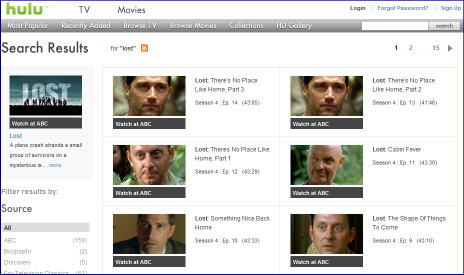-
Disney/ABC's Cheng is Confident About Broadband Video Advertising
Though broadcast TV networks have been aggressively pushing their shows online, there has been simmering angst about what impact this will ultimately have on their traditional economics.
I have explored this issue recently in "Does Broadband Video Help or Hurt Broadcast TV Networks?" and in two posts on Fox's "Remote-Free TV" initiative here and here. NBCU's CEO Jeff Zucker has helped to stoke this concern, publicly calling broadcasters' #1 challenge the risk of exchanging "analog dollars for digital pennies."
Thus I was both a bit surprised, but also encouraged, to hear Albert Cheng, Disney/ABC's EVP of Digital
 Media tell me in a recent briefing that despite the fact that online revenue per program per eyeball is currently less than it is for on-air, he's confident that online will eventually catch up and surpass on-air. I don't regard these comments as idle boasts. A thick PowerPoint deck covering its online video strategy, which Disney/ABC shared with me, reveals the meticulous thought and in-depth audience research that is guiding Disney's online video initiatives. Not to mention ABC.com is the most-used network web site.
Media tell me in a recent briefing that despite the fact that online revenue per program per eyeball is currently less than it is for on-air, he's confident that online will eventually catch up and surpass on-air. I don't regard these comments as idle boasts. A thick PowerPoint deck covering its online video strategy, which Disney/ABC shared with me, reveals the meticulous thought and in-depth audience research that is guiding Disney's online video initiatives. Not to mention ABC.com is the most-used network web site.Cheng is quick to point out that Disney/ABC has followed a careful and consistent strategy since it moved into online distribution a few years ago (note Disney/ABC was the first network to work with iTunes and first to offer programs for free. Other networks quickly followed). The focus has been on continued learning and refinement.
From a strategy standpoint, Disney/ABC's video player, powered by Move Networks, is the centerpiece. The focus is on delivering a high-quality, consistent user experience in which ads are engaging, but not intrusive. While other networks have received more ink for their syndication efforts Cheng is quick to point out that access to Disney/ABC's player has always been open, allowing other sites to refer their users, if not actually integrate the player.
By making an RSS feed available of its online programs' meta-data, Cheng believes Disney/ABC can achieve much of what others gain through syndication deals (see how Hulu displays results for a "Lost" search below, subtly noting "Watch at ABC" This is the same concept I noted in my recent Hulu vs. Comcast post), while avoiding the downsides of ad sales conflicts, business rules implementation and delivery overhead.

By controlling their own ad inventory, Disney/ABC avoids the sometimes one-sided revenue sharing deals widely-discussed in the industry (Hulu alone is rumored to keep 90%) and the channel conflict that inevitably results from having two sales teams calling on the same media buyers. Cheng does see a role for online aggregators, but mainly for library or off-network product, especially as a backstop for traditional syndication.
Cheng's rationale for broadband's eventual revenue superiority to on-air ultimately boils down to this: since broadband can offer both superior targeting and engagement vs. on-air, by definition it deserves higher pricing. But getting to that vision from today's reality is where Disney/ABC's hard work of evangelizing to advertisers and ongoing testing is key (and where the company's recently announced "Ad Lab" comes in).
Here again, by controlling its own inventory and player experience, Cheng believes Disney/ABC is better positioned than other networks. He surmises that, public comments notwithstanding, other networks are not selling out their inventory and are getting lower CPMs than Disney/ABC. Maybe this helps explain the "analog dollars, digital pennies" angst?
Disney/ABC's efforts to fully monetized broadband delivery will be closely watched as an indicator of broadband's true impact on broadcasters. And while I believe Cheng's regard for broadband's potential is correct, broadcasters still face the very real headwinds of consumer distaste for ads in general, the proliferation of ad-skipping through DVRs, and the expectations being set with limited ads in current online implementations.
While I'm rooting for Disney/ABC and others to succeed in broadband video advertising, I think they have their work cut out for them.
What do you think? Post a comment and let everyone know!
Categories: Advertising, Broadcasters


